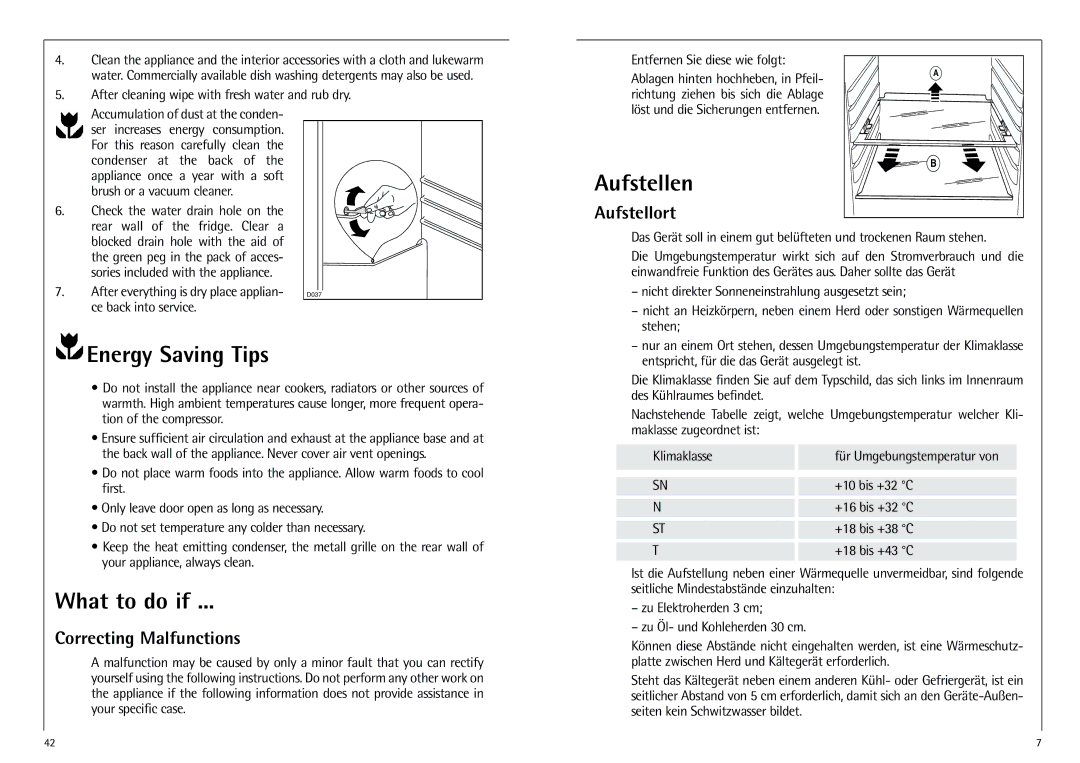
4.Clean the appliance and the interior accessories with a cloth and lukewarm water. Commercially available dish washing detergents may also be used.
5.After cleaning wipe with fresh water and rub dry.
Entfernen Sie diese wie folgt:
Ablagen hinten hochheben, in Pfeil- richtung ziehen bis sich die Ablage
A |
Accumulation of dust at the conden- ser increases energy consumption. For this reason carefully clean the condenser at the back of the appliance once a year with a soft brush or a vacuum cleaner.
6. | Check the water drain hole on the |
| rear wall of the fridge. Clear a |
löst und die Sicherungen entfernen.
Aufstellen
Aufstellort
B |
| blocked drain hole with the aid of |
| the green peg in the pack of acces- |
| sories included with the appliance. |
7. | After everything is dry place applian- |
| ce back into service. |
Das Gerät soll in einem gut belüfteten und trockenen Raum stehen.
Die Umgebungstemperatur wirkt sich auf den Stromverbrauch und die einwandfreie Funktion des Gerätes aus. Daher sollte das Gerät
– nicht direkter Sonneneinstrahlung ausgesetzt sein; |
– nicht an Heizkörpern, neben einem Herd oder sonstigen Wärmequellen |
stehen; |
 Energy Saving Tips
Energy Saving Tips
•Do not install the appliance near cookers, radiators or other sources of warmth. High ambient temperatures cause longer, more frequent opera- tion of the compressor.
•Ensure sufficient air circulation and exhaust at the appliance base and at the back wall of the appliance. Never cover air vent openings.
•Do not place warm foods into the appliance. Allow warm foods to cool first.
•Only leave door open as long as necessary.
•Do not set temperature any colder than necessary.
•Keep the heat emitting condenser, the metall grille on the rear wall of your appliance, always clean.
What to do if ...
Correcting Malfunctions
A malfunction may be caused by only a minor fault that you can rectify yourself using the following instructions. Do not perform any other work on the appliance if the following information does not provide assistance in your specific case.
– nur an einem Ort stehen, dessen Umgebungstemperatur der Klimaklasse |
entspricht, für die das Gerät ausgelegt ist. |
Die Klimaklasse finden Sie auf dem Typschild, das sich links im Innenraum des Kühlraumes befindet.
Nachstehende Tabelle zeigt, welche Umgebungstemperatur welcher Kli- maklasse zugeordnet ist:
Klimaklasse |
| für Umgebungstemperatur von |
|
|
|
|
|
|
SN |
| +10 bis +32 °C |
|
|
|
N |
| +16 bis +32 °C |
|
|
|
ST |
| +18 bis +38 °C |
|
|
|
T |
| +18 bis +43 °C |
|
|
|
Ist die Aufstellung neben einer Wärmequelle unvermeidbar, sind folgende seitliche Mindestabstände einzuhalten:
–zu Elektroherden 3 cm;
–zu Öl- und Kohleherden 30 cm.
Können diese Abstände nicht eingehalten werden, ist eine Wärmeschutz- platte zwischen Herd und Kältegerät erforderlich.
Steht das Kältegerät neben einem anderen Kühl- oder Gefriergerät, ist ein seitlicher Abstand von 5 cm erforderlich, damit sich an den
42 | 7 |
